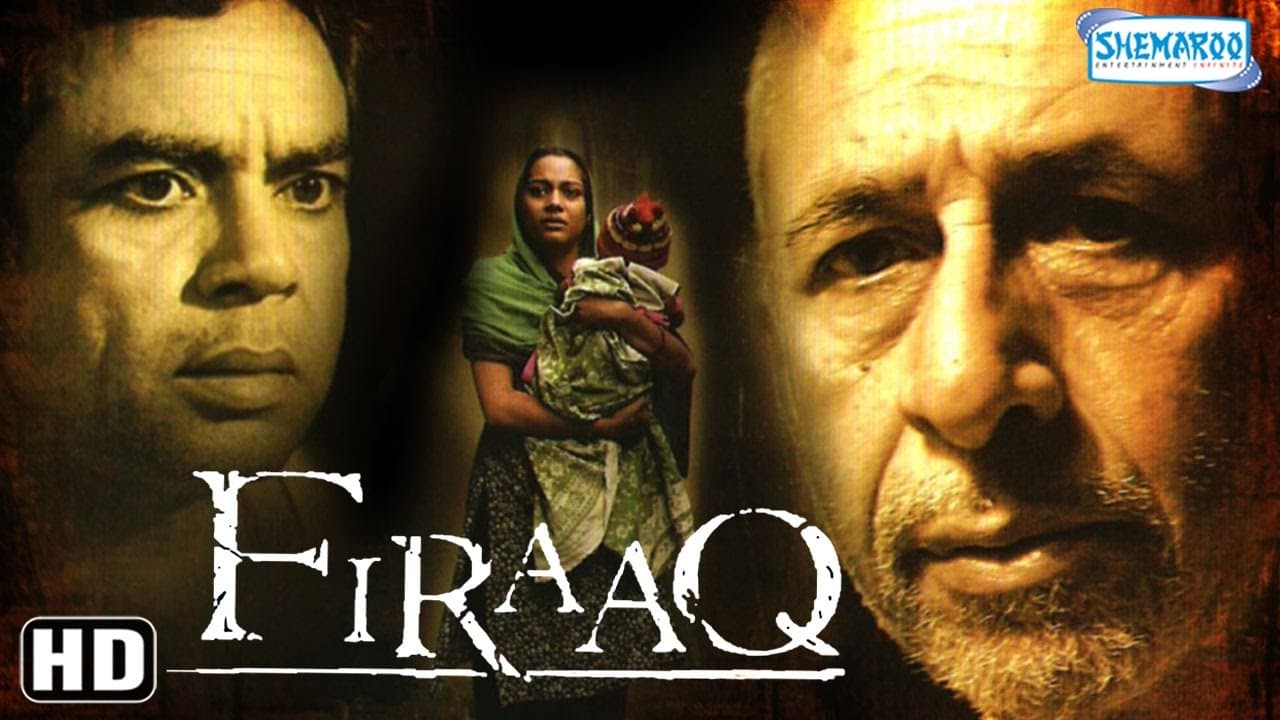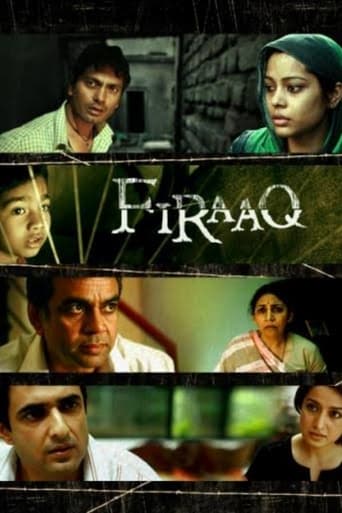



That was an excellent one.
Good start, but then it gets ruined
This is a small, humorous movie in some ways, but it has a huge heart. What a nice experience.
View MoreStrong acting helps the film overcome an uncertain premise and create characters that hold our attention absolutely.
View More"Firaaq' is a non-commercial low budget movie which marks the debut of Nandita Das as a director; and with her directorial venture, she proves she's even a better film-maker than a stunning actress. The film presents the aftermath of Gujrat riots of 2002, and was also said to be banned. The story is seen through a set of characters, especially the Muslims, and their changed lives after the riots. The dialogues and the narration of the story just holds you tight to your seats; and what you see are the rewarding performances from the distinguished performers like Naserudddin Shah, Raghuvir Yadav, Nawazzudin Siddhiquie, and Deepti Naval. The only fault I felt in the movie was though the story gets mounted well, the conclusion feels a bit weak and incomplete and leaves you with a feeling that something is left out.Rating : 2 stars out of 4
View MoreThe first attempt of veteran indie actress Nandita Das in directing is a spellbinding film which takes the Gujurat Riots of 2002 as its backdrop. We are introduced to four main plots - a Gujarati family complicit in the riots, one mixed marriage (Muslim male, Hindu female), one Muslim classical singer and one couple who return home after the riots have ended. And caught up in these people is an orphan who has lost his parents and is roaming around the city.The individual stories of the film are excellently done, themes of inter-religious marriages, abusive husbands, guilt of not helping Muslims, victims turning to violence, police brutality, middle class hypocrisy (One scene was excellent: A wedding is taking place. The bride is being decorated by a Muslim who has had her house burnt. And the bride is cussing how these "bloody Muslims" have ruined her marriage) are very poignantly dealt with.But the movie feels lacking a thematic closure. It was as if Nandita Das got tired and said "Ok, thats it! 101 minutes, thats all the runtime I can give. I just don't want to connect all these themes!" and left the film. Which is what just what I wanted - a sort of closure. Right now, Firaaq is movie which just gives us a glimpse of these people lives without letting us know what will happen to them in the future. That is something which IMO, should have been shown.None the less, this is a fine piece of Indian cinema - a far cry from the banal Bollywood dance numbers, masala filled movies. Thumbs up for the effort!
View MoreI admit that I was quite interested about Firaaq, mainly because of the international felicitation that it has received. Yet I was a little hesitant in going for the movie especially after a long week at work - I didn't want to watch a heavy movie about the Gujarat riots! I instead chose what I thought would be a light movie Straight (and regretted it). But I couldn't be more wrong about Firaaq ...Yes its set amidst the Gujarat riots a month after it, to be precise. But it doesn't have any of the violence or bloodshed of the riots. It instead follows a set of people who are struggling to come to terms with life in the aftermath of the riots. Nandita Das has taken some ordinary people and showed us how they react when faced with something extraordinary it brings out the worst in some like Paresh Rawal while some like Sanjay Suri look to escape.It is a rare movie that can stir up a whirlpool of emotions inside the viewer feelings as diverse as loathing, despair, hope and happiness and everything that is in between all in a runtime of just 100 minutes. Nandita Das exceeds expectations in her directorial debut in Firaaq, taking on the Gujarat riots issue with a wonderful sensitivity. Sure, she has the advantage of having a stalwarts like Naseeruddin Shah & Paresh Rawal in Firaaq - but the finesse with which the screenplay seamlessly weaves all the story together is completely to her creditFrom a slightly disturbing opening scene, we are introduced to the different characters and their dilemmas - the Hindu-Muslim urban couple who are leaving town, a Muslim couple who come back to their home to find it burnt down, the gujarati housewife struggling to come to terms with her guilt, a orphaned child looking for his family and an ageing singer oblivious to reality Each of the actors' performance has been stellar you cannot help but loath Paresh Rawal and equally you share Deepti Naval's agony and her wish for atonement. Naseeruddin Shah is in a league of his own, playing a musician from a forgotten generation who is disconnected from today's world.As if the multitude of stories were not enough, each of the stories tug at your heart in different directions. From the despair at finding her entire household in ashes to the suspecting her best friend, from the fear of the police to the anger at the bride's silly remarks about the riots, Muneera (Shahana Goswami) bares her thoughts to us. The sharing of the bindi between friends and the intermixing of the names Mohan and Mohsin the movie is replete with such subtle subtexts.With its limited runtime, Firaaq doesn't conform to the traditional norms of giving a background to each story or taking each of them to a logical conclusion. So maybe it might feel a little abrupt at the start to some. But such trifling irritants are completely forgotten by the time you finish watching Firaaq as you would find yourself overwhelmed with conflicting emotions.I regularly review movies at http://bisprad.blogspot.com
View MoreIf I were given a chance to give out an award during this festival, then Firaaq by Nandita Das would be my choice for the best film I've seen during the festival. And it's quite amazing in itself being a first film of the accomplished Indian actress, that it's laced with sensitivity while at the same time tackling some hard issues head on that deals with the deep rooted negative human condition of hate and violence.Set against the backdrop of the aftermath of the 2002 Gujarat riots between the Hindu and Muslim communities in Gujarat, India, it's an ensemble film with a myriad of characters in multiple story threads which involves a Muslim family who returns to their home only to find it burnt by rioters, of a mixed marriage couple who has to deal with their fears and decision to leave Gujarat for Delhi, of a woman who gets haunted by the ghosts of the incident, and punishes herself for her inaction, of a group of Muslim men all flustered and planning for revenge, of a young orphan wandering the streets, and the list goes on.In each of the threads, which for the most parts are independent of one another, Nandita Das weaves very moving stories and crafts very interesting characters to function within each story, either serving as a mouthpiece for keen observations, or highlighting very deep rooted fears. The film doesn't flinch from making harsh criticisms or statements through dialogues and interactions between characters, and Das manages to paint characters on both sides of the equation, some exhibiting bad behaviour even when confronting their prejudices or when confronted by their fears. If I could draw a parallel to an established film that Firaaq gets close to, then it will be Paul Haggis' Oscar winner Crash.One can imagine the human rights violations committed during the tense period, and it's quite natural to see how the outcome of such violations through the mob mentality, affect the common man even after the tumultuous period had passed over, because deep inside, we all know that some prejudice are hard to eradicate. I thought the story of Sameer and Anu was one of the most striking of the lot, and most enduring as well, though with each protection dished out by the wife, the husband feels more insecure about his manhood. Some of the most direct and pointed conversations happen when they are on screen, especially how one's inherent self-preservation mechanism kicks in and would go through anything as extreme as a name change to avoid another extreme such as being stripped to verify identities.The final act was actually quite chilling, and I felt it could cut either way, depending on your outlook. One, that it is of hope, that with the next generation lies opportunity to bury the past and forge a new future ahead filled with better understanding, and the appreciation that such violence should never occur again. On the other hand, it reminds of how impressionable a young mind is, and through the wandering within a camp, taking in the sights of the aftermath of atrocities committed, that the seeds of revenge could have been innately planted, and being ready for improper indoctrination for further atrocities to be committed, some time in the future. It's extremely difficult, but not impossible, to break the stranglehold that violence begets more violence.For a rookie director, I feel that Nandita Das has demonstrated that she has what it takes to join the illustrious ranks of female Indian directors in telling very mature stories through assured technique. Firaaq is a shining example, and I hope to see more of her directorial work again soon. Definitely a highly recommended movie in these troubled times of ours, to hold a mirror up against oneself, for some serious self-examination within.
View More